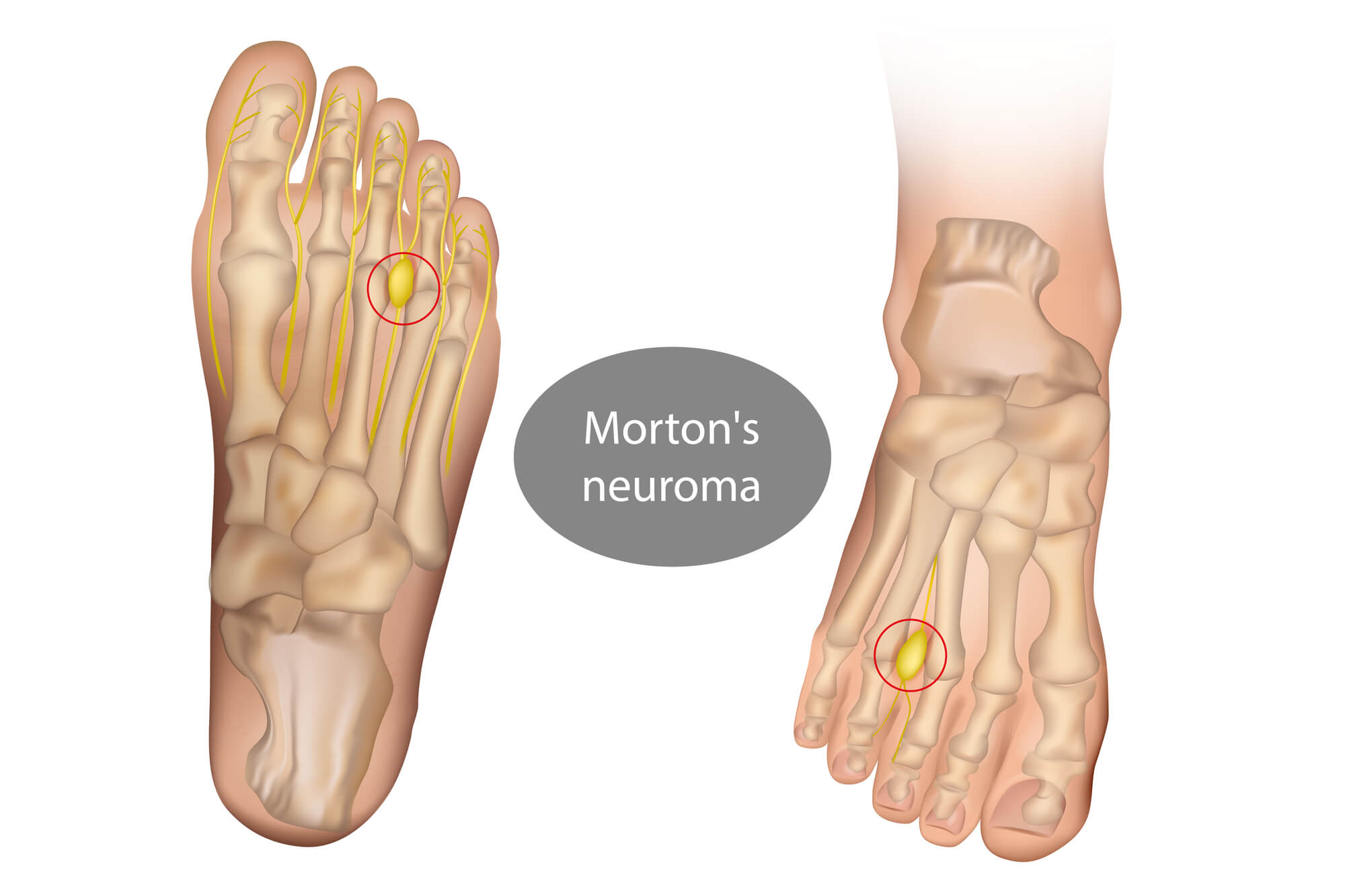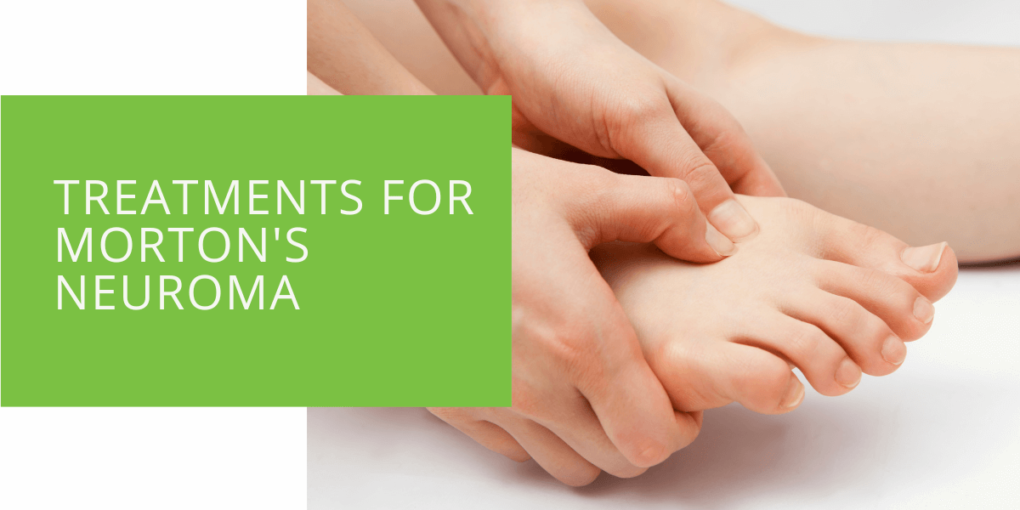Treatments for Morton’s Neuroma
Morton's Neuroma is a painful condition that affects the ball of your foot, usually between the third and fourth toes. It occurs when the tissue surrounding the nerves leading to the toes thickens, causing compression and irritation of the nerves. This can result in symptoms such as burning pain, tingling, numbness, and discomfort when walking. This article will discuss the most effective treatments for Morton's Neuroma to relieve foot pain and improve mobility.
Non-Surgical Treatments
Several non-surgical treatments can effectively manage Morton's Neuroma symptoms. These treatments include padding and taping, footwear modifications, custom orthotics, and medications.
1. Padding and Taping
Padding and taping are effective non-surgical treatments temporarily relieve Morton's Neuroma pain. This treatment involves placing a small pad or cushion between the metatarsal bones, which helps relieve pressure on the affected nerve. Taping also supports the foot and reduces the movement that could aggravate the condition. The podiatrist can demonstrate how to apply the padding and taping correctly, or they may apply it for you.
2. Footwear Modifications
Wearing the right type of footwear is essential in managing the symptoms of Morton's Neuroma. Shoes with a wide toe box and a low heel can reduce pressure on the forefoot and provide more room for the toes to move. Tight or high-heeled shoes should be avoided, as they can cause discomfort and worsen the condition. Avoiding shoes with pointed toes or that is too narrow is also recommended.
3. Custom Orthotics
Custom orthotics are specially designed shoe inserts that can help relieve pressure on the affected nerve and support the arch of the foot. These orthotics are custom-made to fit the individual's foot and can help redistribute the body's weight, reducing pressure on the forefoot. Orthotics can be especially helpful for individuals with high arches or flat feet, which can contribute to the development of Morton's Neuroma.
4. Medications
Over-the-counter pain medications such as ibuprofen and acetaminophen can effectively reduce pain and inflammation associated with Morton's Neuroma. In addition, corticosteroid injections may be recommended by a healthcare professional to reduce inflammation and swelling around the affected nerve. However, it is important to note that these injections should only be used as a short-term solution and not relied upon as a long-term treatment.

Surgical Treatments
In cases where non-surgical treatments fail to provide relief, surgery may be necessary. Surgical treatments for Morton's Neuroma include neurectomy and decompression surgery.
1. Neurectomy
Neurectomy is a surgical procedure that involves the removal of the affected nerve. This surgery is typically only recommended if non-surgical treatments have failed and the pain is severe enough to interfere with daily activities. The surgeon removes the affected nerve through a small incision during the procedure. Although removing the nerve can cause numbness in the toes, many people can resume normal activities and experience long-term pain relief.
2. Decompression Surgery
Decompression surgery involves releasing pressure on the affected nerve by cutting the ligament that runs over the nerve. This can help reduce the compression and irritation of the nerve, resulting in pain relief. This procedure is typically recommended for those who have not responded well to non-surgical treatments but are not candidates for neurectomy.
The surgery is typically performed under local anesthesia; the patient can usually return home the same day. After the procedure, the patient may experience swelling, pain, and discomfort, which can be managed with pain medications and rest. The recovery time for decompression surgery is usually around six weeks, during which the patient is advised to limit physical activity and wear supportive shoes.
Conclusion
Morton's Neuroma can be a frustrating and painful condition, but many treatments available can provide relief. Non-surgical treatments such as padding and taping, footwear modifications, orthotics, and medications can effectively manage the symptoms of Morton's Neuroma. In severe cases, surgery may be necessary, and options include neurectomy and decompression surgery. Suppose you are experiencing foot pain or other symptoms of Morton's Neuroma. In that case, it is important to consult with an orthopaedic surgeon or foot and ankle specialist to determine the best treatment for your specific needs. With the right care and management, you can find relief from the pain and discomfort of Morton's Neuroma and improve your quality of life.
FAQ
What is the best treatment for Morton's neuroma?
The best treatment for Morton's Neuroma depends on the individual and the severity of the condition. Non-surgical treatments such as padding and taping, footwear modifications, custom orthotics, and medications are usually the first line of treatment. However, in severe cases, surgery may be necessary. It is important to consult with a healthcare professional to determine which treatment options are best for you.
Does Morton's neuroma ever go away?
Morton's Neuroma is a chronic condition that may not go away on its own. However, with proper treatment, the symptoms can be managed effectively, and pain relief can be achieved. It is important to seek treatment as soon as possible to prevent the condition from worsening.
What happens if Morton's neuroma goes untreated?
The condition may worsen if Morton's Neuroma goes untreated, causing more severe pain and discomfort. The affected nerve may become enlarged, leading to permanent nerve damage. Additionally, untreated Morton's Neuroma can lead to changes in gait and posture, which can cause other foot and ankle problems.
How long does it take for Morton's neuroma to go away?
The time it takes for Morton's Neuroma to go away depends on the severity of the condition and the chosen treatment method. Sometimes, non-surgical treatments can provide significant relief within a few weeks. However, more severe cases may require surgery, which can take up to six weeks to recover fully. It is essential to consult with a healthcare professional to determine the most effective treatment plan for your individual needs.

